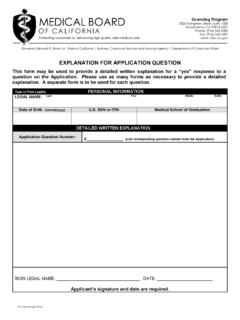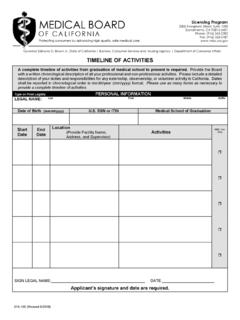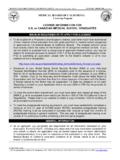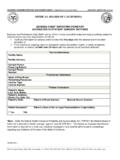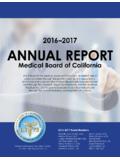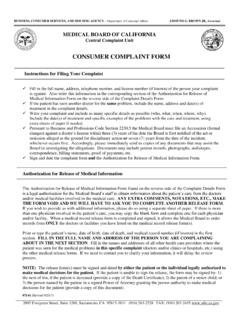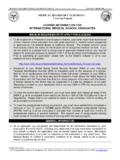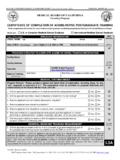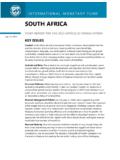Transcription of Mandatory Consultation – Frequently Asked Questions
1 OF CALIFORNIA MEDICAL BOARD Executive Office 2005 Evergreen Street, Suite 1200 Sacramento, CA 95815-5401 Phone: (916) 263-2382 Fax: (916) 263-2944 Protecting consumers by advancing high quality, safe medical care. Governor Edmund G. Brown Jr., State of California | Business, Consumer Services and Housing Agency | Department of Consumer Affairs Controlled Substance Utilization Review and Evaluation System (CURES) Mandatory Consultation Frequently Asked Questions 1. What does Mandatory use of or Consultation of CURES mean?
2 This requirement means that unless an exemption exists in law, a physician must query the CURES database and run a Patient Activity Report (PAR) on each patient the first time a patient is prescribed, ordered, or administered a Schedule II-IV controlled substance. The PAR must be run within twenty-four hours, or the previous business day, before prescribing, ordering, or administering the controlled substance. In addition, a physician must also query the database at least once every four months if the controlled substance remains a part of the patient s treatment plan.
3 Please go to the Board s website for more information. 2. What does first time mean? First time is defined as the initial occurrence in which a health care practitioner intends to prescribe, order, administer, or furnish a Schedule II-IV controlled substance to a patient and has not previously prescribed a controlled substance to the patient. 3. What actions constitute successfully meeting the requirement to "consult CURES?" For example, can a staff member or other proxy consult CURES on behalf of the physician?
4 Consulting CURES means the physician prescribing, ordering, administering, or furnishing the Schedule II-IV controlled substance has received a Patient Activity Report (PAR) and has reviewed the information on the document. While a physician can have a registered delegate request the CURES report, the report will go into the physician s dashboard on CURES so the physician can review the PAR prior to prescribing, ordering, administering, or furnishing. 4. How do I document that I checked CURES prior to prescribing, is a note in the chart sufficient or do I print the CURES report and put it in the patient s file?
5 If a physician consults CURES, it is not required to note it in the patient s file; however, the Board recommends the physician do so. It is up to the physician to determine how to document that he or she consulted CURES, , document it in the chart or print the report and place it in the patient s file. 5. How do I document I had an exemption and did not need to check CURES? Most exemptions do not require a physician to document that he or she did not consult CURES because an exemption applied; however, the Board still recommends that a physician document the patient s record with the reason for not consulting CURES.
6 Documentation of an exemption is required if it is not reasonably possible for a physician to access the information in the CURES database in a timely manner, another physician, who can access the CURES database, is not reasonably available, and the quantity of the controlled substance does not exceed a non-refillable five-day supply of the controlled substance. 6. Can the Board audit CURES to determine physician compliance? Yes, the CURES Program has the ability to audit the activity of users within the system and the Board has access to this activity.
7 CURES Mandatory Use FAQs Page 2 7. How will the Board know that I did not check CURES and what are the consequences or administrative sanctions of non-compliance with Mandatory use? The Board can receive information about non-compliance through a number of ways. The Board may receive a complaint from a patient, another licensee, or any other source that the physician is not consulting CURES as required. In addition, during the review of any investigation into a physician s care and treatment, the investigator, as part of the investigation process, will ensure CURES was consulted prior to prescribing, ordering, administering, or furnishing controlled substances as required by law.
8 Failing to consult CURES is a violation of the law and it could result in the issuance of a citation and fine, or could be a cause of action in an accusation that leads to disciplinary action. Disciplinary action could be a public reprimand, suspension, probation, or revocation. Each violation of the law is reviewed on a case-by-case basis. 8. Can a medical assistant or nurse be a delegate as listed in the CURES Program? The law requires the prescribing physician consult the CURES database. Consistent with DOJ procedures pursuant to Business and Professions Code section 209, a physician may authorize a delegate to order reports from CURES.
9 However, it is important to note that the delegate can only request the Patient Activity Report (PAR). The report will be sent to the physician s dashboard and only the physician can go in and review the PAR. Please remember that a physician may not provide his/her CURES password to anyone. 9. We are this type of a facility. Do the physicians in our facility have to run a CURES report prior to prescribing? It is the Board s recommendation that you review the specific sections of law for each of the facility types and determine if your facility is exempt while the patient is admitted to your facility or if the patient is seen at your facility for a surgical procedure.
10 You may choose to seek legal counsel to assist in your review of the appropriate sections of law. To assist with your review, here are the specific links for each facility type where an exemption may apply: Licensed clinic: Outpatient setting: Health facility: County medical facility: Place of practice: CURES Mandatory Use FAQs Page 3 10. In a teaching clinic, or similar setting, often providers have to write prescriptions for other providers who may be out. If I am writing a prescription for a Schedule II-IV controlled substance, which the record confirms the patient has previously received, will I have to check CURES?
